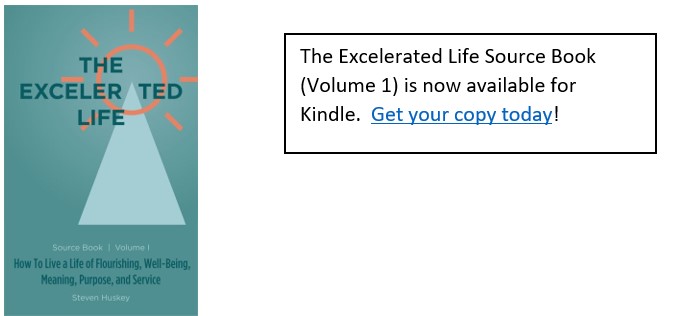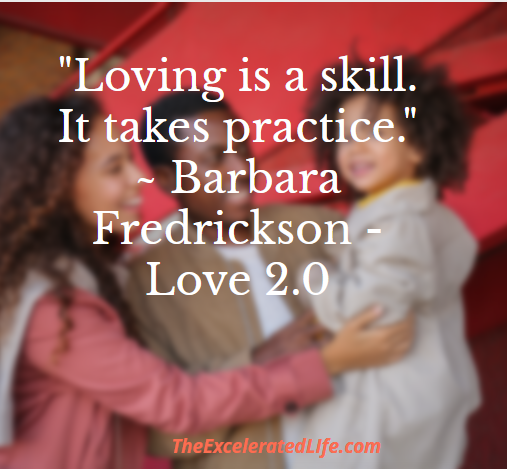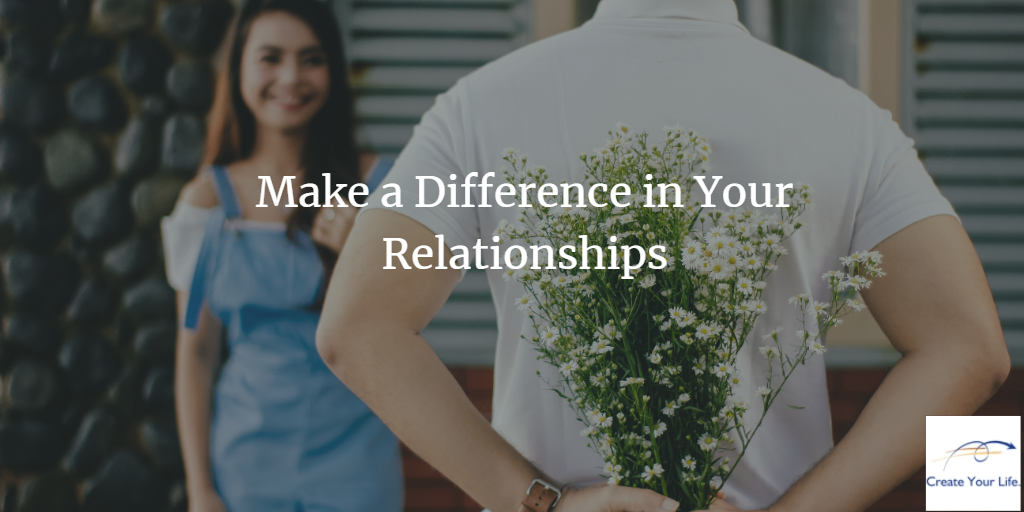If we want to flourish as human beings, we require warm and trusting relationships with other people. So begin making a difference in your relationships.
“We Cannot Live Without Each Other”
When I was in my mid-30s, I received a gift, Earl Nightingale’s “Lead The Field” program on cassette tapes. To say it was life-changing for me is not an exaggeration. It opened my eyes and my mind to concepts I’d not heard before. In fact, I still have the cassettes but I have no cassette player. So I eventually got the program on CDs.
I was listening to them again the other day and heard this lasting truth: “Never before in the history of the world have human beings been so interdependent. It is as impossible to live without serving others as it would be to live if others were not constantly serving us. . . . We need each other, and we literally cannot live without each other.” (My emphasis.) [Nightingale]
It gave me – and I hope it gives you – a refresher on why relationships are so important.
Why You Need Relationships
Relationships are a necessary part of a life of flourishing, well-being, and meaning. So much so that Martin Seligman, a leader in the Positive Psychology movement, made relationships a core part of PERMA, his well-being theory.
As a matter of fact, Seligman says, “very little that is positive is solitary”. Seligman tells us that the best antidote to the things that bring us down is other people. And they are also the most reliable way to lift us up. [Seligman]

Flourishing is one of the outcomes we look for when we embrace an Excelerated Life™. And flourishing as a human being requires that we have “warm and trusting relationships with other people”. [Fredrickson] Research shows that those of us who flourish spend more time in the company of others and less time alone. [Fredrickson] The science is clear, states Barbara Fredrickson. We “gain more positivity by being with others than by being alone”. [Fredrickson]
Sonja Lyubomirsky, another eminent Positive Psychologist, has also extensively studied how relationships boost happiness. Dr. Lyubomirsky says we have an innate desire to seek out and maintain strong, stable, and positive interpersonal relationships. She has found that a sense of belonging impacts our physical and mental health in a positive way. In short, people with strong social support are healthier and live longer.
Relationships make a difference in us. And we can make a difference in our relationships.
Why Relationships Need You
“We need each other, and we literally cannot live without each other.” ~ Earl Nightingale
Just as you need other people to flourish, others need you. Think of your family and friends, the social groups to which you belong, your spouse or romantic partner, your children, your parents. None of these relationships would be the same without you and the uniqueness you bring to each one.
With a little knowledge and the desire to contribute to them, you have the capability to deepen any and all of your important relationships. Let’s look at ways you can make a difference in your relationships.
What Relationships Need
We need relationships and relationships need us. But how can we deepen and improve our relationships? This is not a comprehensive list but if you keep these in mind, you’ll have the basis for building strong relationships and improving existing ones.
Honesty. Of course, you want to avoid major deceptions, the kind you see in “Dear Abby”: “My boyfriend told me he was a lumberjack but I discovered he’s really an axe murderer.” However, try to avoid those tiny white lies as well. Even small dishonesties can set a trend and create big trust issues.
Open communication. Hand in hand with honesty goes open communication. Open and honest communication is one of the most important characteristics of a strong, healthy relationship. And remember, listening is as necessary as talking for a mutually beneficial conversation.
Commitment. An obvious commitment in romantic relationships is fidelity, being true to your partner. But we need to be committed to our other relationships as well. We want to be devoted to all our relationships, to see them flourish. And to do so, we must be dedicated and willing to give time and energy to the relationship.
Boundaries. Being open, honest, and committed all help build and strengthen relationships, but those don’t preclude setting some boundaries. There’s that “axe murderer vs. lumberjack” thing, but I’m also talking about more personal boundaries. For example, I have a personal boundary regarding gossip and talking about people who are not present. My rule is “Assume that the other person will hear what you say and speak accordingly”. I bring that rule to my relationships as well and set the boundary to not listen to nor participate in gossip about others.
Trust. Trust takes time to build. It is accomplished by giving and keeping your word. Being committed to the relationship helps build trust. Open communication helps, too. And honesty is essential. Trust may be a bit uncertain in the beginning, simply because the relationship is new. But over time, by making and keeping promises, and being open and honest, you’ll create trust.

Making a Difference in Your Relationships
If you are serious about and dedicated to making a difference in your relationships, then model these helpful behaviors. Don’t wait for the other person to make the first move.
Let go of the need to change the other person. Accept them as they are. It’s really the only rational choice. “[W]e have no power to change another’s behavior, only the power to change our own.” [McCoy]
Realize that no one is perfect. As one of my teachers and mentors is fond of saying, “There are no perfect people in the world and you and I are not going to be the first.” Find ways to cope or address issues on your own. We cannot control others’ behavior, we can only control our own. “Be merciful rather than critical of the small ways your partner isn’t perfect.” [McCoy]
Use Active/Constructive responses. Recall the ways we can respond to good news from a friend, partner, spouse, or other person. These are the four response types.
- Active and Constructive – enthusiastic support. You react enthusiastically.
- Passive and Constructive – quiet, understated support. You’re happy but generally unresponsive.
- Active and Destructive – demeaning the event. You respond by focusing on the negative aspects of the news.
- Passive and Destructive – ignoring the event. You are uninterested.
To make a difference in your relationships, practice using active and constructive responses.
Create “high-quality connections” [Fredrickson] in your various relationships. Barbara Fredrickson teaches that there are four ways to build high-quality connections. [Fredrickson]
- Respectful engagement with others – present, attentive, and affirming.
- Support the other person – do what you can to help him or her succeed.
- Trust – believe in the other person and let it show.
- Play – allow time to be together with no particular outcome in mind; have fun together.
Finally, be supportive and loyal. [Lyubomirsky] Celebrate their victories with them (as in Active/Constructive responses). Stand up for them when they’re not there. Don’t put down their other friends. And repay favors. [Lyubomirsky]
Strategies For Investing In Relationships
To make a difference in your relationships, try some of these suggestions which I’ve adapted from The How of Happiness by Sonja Lyubomirsky
Make time.
- Commit to spending extra time with your partner each week.
- Spend five minutes each day expressing appreciation or gratitude for specific behaviors.
- Before you part in the morning, find out one thing each of you is going to do that day. When you meet again, have a “reunion conversation” in a low-stress setting and listen.
- Schedule several hours once a week and make it a dedicated ritual. During this time, do something, or share an experience, together.
- Create a media-free zone in your home, reserved for conversations only.
Express admiration, appreciation, and affection.
- Happy relationships are characterized by a ratio of 5 positive statements or behaviors to each negative one. Resolve to raise your positive-to-negative affect ratio each week.
- Communicate your admiration and gratitude directly to your partner.
- The difference between good and poor relationships is not in how partners respond to each other’s disappointments and reversals, but in how they respond to good news. Resolve to respond with interest and enthusiasm to your friend’s and loved one’s good news.
- When your partner is excited to tell you something, pay close attention, ask lots of questions, and relive the experience. If you are happy for them, tell them so.
Manage conflict.
- Happy couples “fight fair”. Avoid criticism, contempt, and stonewalling.
- You can voice a complaint without making it a criticism of the other person’s character.
- Look for ways to deescalate tension and negativity during an argument, such as using friendly humor or expressing affection.
Share an inner life.
- Each week do at least one thing that supports your partner’s roles and dreams.
Making a Difference in Your Relationships (Reprise)
You need relationships to create a life of flourishing, well-being, and meaning. And your relationships need you and the uniqueness you bring to each one. Strong, nourishing relationships require honesty and open communication between partners, commitment to the relationship, trust between partners, and boundaries so you can adhere to your principles within the relationship.
You can build deep, satisfying relationships by keeping these ideas in mind. Don’t expect perfection and don’t try to change the other person. React to good news actively and constructively. Create high-quality connections by being respectful, supportive, trusting, and playful. Be loyal to the other people in the relationship; always assume that the other person will hear what you say and speak accordingly.
“We need each other, and we literally cannot live without each other.” If we want to flourish as human beings, we require warm and trusting relationships with other people. So begin making a difference in your relationships. That is one step in embracing your Excelerated Life™!
Do you have an important relationship that could use some polishing?
What is one thing you could do to make a difference in that relationship?
Share your thoughts by leaving a comment below.
Developing Excelerated Relationships™ — nurturing ties to other people — is one step in creating your Excelerated Life™, a life of flourishing and well-being, and a life of meaning, purpose, and service.
Read more about the Excelerated Life™.
Resources:
Fredrickson, Ph.D., Barbara, L. Positivity. New York: Crown Publishing Group, 2009.
Lyubomirsky, Sonja. The How Of Happiness. New York: Penquin Books, 2007.
McCoy Ph.D., Kathy. “Making a Difference in Love.” Psychology Today. Sussex Publishers, LLC, January 27, 2020. Web. August 27, 2022.
https://www.psychologytoday.com/us/blog/complicated-love/202001/making-difference-in-love
Nightingale, Earl. “Lead The Field.” PDFDrive. Asaha Inc., . Web. Date July 17, 2020. PDF file.
https://www.pdfdrive.com/lead-the-field-e186040772.html
Seligman, Ph.D., Martin E. P. Flourish. New York: Free Press, 2011.


